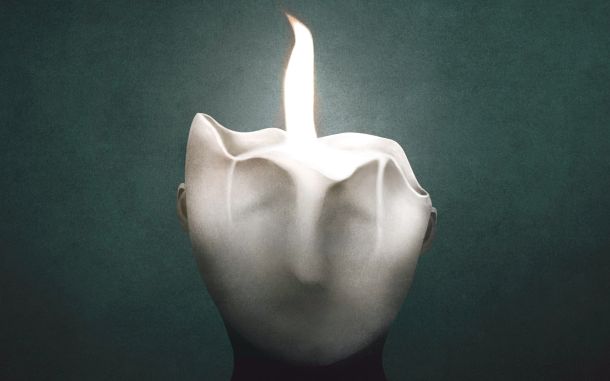Wakefulness (Yaqada)

In This Article
-
Some scholars have interpreted wakefulness as being where initiates perceive the Divine purpose in His prohibitions, especially at the beginning of the journey.
-
Wakeful travelers to God receive beneficial advice from whatever they hear, and see every thing and event as being a different tablet of instruction, and continuously travel on the horizon of thinking, reflecting, and pondering.
-
Wakeful travelers are deeply conscious that the Ultimate Truth always sees them, and think that, since He always sees them, they must therefore remain alert and self-possessed.
In the language of Sufism, yaqada (wakefulness) means that an initiate must be aware, careful and sensitive with respect to God’s commandments at the beginning of the journey, and without failing into any confusion, must be straightforward in thought, preserve spiritual balance, and act with insight in the face of the gifts that come as a result of advancing to the final point.
There have been somewhat different approaches to wakefulness. Some scholars have interpreted wakefulness as being where initiates perceive the Divine purpose in His prohibitions, especially at the beginning of the journey. When they have reached the final point where they are on the journey “toward God and with God and in God,” which denotes “subsistence” or “maintenance by God,” they should act with self-possession as if seeing God or as if being in His Presence. In the consciousness and knowledge of God that is required by the rank where they are, and thinking of themselves as humble servants of God, Whom they need at every breath and of Whom they should not be heedless even for a moment, they should always fix their eyes in humility and awareness on the door of God in expectation of His favors and in fear of any reproach from Him. They should be in constant wakefulness, thinking as Ibrahim Haqqi of Erzurum did:
Does sleeping in heedlessness behoove a humble servant, while the All-Merciful calls (His servants) with affection at nights?
Wakeful travelers to God act with insight at every step of the spiritual journey and represent the truth expressed in Say (O Messenger!): “This is my way: I call to God based on conscious insight and sure knowledge—I and those who follow me” (12:108). They receive beneficial advice from whatever they hear, and see every thing and event as being a different tablet of instruction, and continuously travel on the horizon of thinking, reflecting, and pondering. There is wisdom in their speeches, and a lesson in their silence, and their manners inspire awe. They remember God in the face of what they encounter, and their own faces reveal Him.
Such a degree of wakefulness can be also viewed as the deepening of insight and the horizon of the revival of an initiate with respect to “the reason occupied with and skilled in the matters of the Hereafter.” Some have considered it as an aspect or dimension of the heart. One of the important means of reaching this point is frequently reciting O the All-Living, O the Self-Subsisting, there is no deity but You. Frequent repetition of There is no deity but You, I appeal to Your help for the sake of Your Mercy, is another means. In attainment of this rank, it is also important to have adequate knowledge of the “days of God.” That is, we should never forget why and how God favored His obedient servants in the past and why and how He punished the rebellious.
Having a sound and sincere intention and viewpoint and being free from prejudices are among the important conditions needed to preserve wakefulness. Those whose minds are under the influence of their carnal impulses, whose eyes are closed to the lesson given by the “days of God,” and whose viewpoint is wrong, can have no insight, nor can they be wakeful. If wakefulness is seeing deeply and becoming acutely aware of being observed, then this can only be possible by having deep insight, by observing God’s rights, and by acting in awareness of always being seen by God. Those who cannot keep their eyes away from the “pictures” of others and their hearts from memories shared with others cannot be wakeful ones, nor can they be safe from falling, no matter what rank they have achieved. Safety is a special gift of God given to those who have spent their lives in quest of it. This is why those who regard themselves as safe are by no means safe.
Having a wakeful heart and eyes is dependent on the awareness of the fact that the Ultimate Truth always sees and knows us in the state in which we are and always knows with what we are occupied, and on turning to Him with all our being, and spending our lives in consciousness that we are always in His presence. The author of Nazmu’l-Maqamat, observes:
Always turn to that Most Exalted Being in humility, and with utmost poverty and helplessness;
to the extent that even if yourself were to give it up,
your heart should never falter and should remain fast in its place.
This is what people of truth call “presence,” And this is the reason why we always mention Him.
Wakeful travelers are deeply conscious that the Ultimate Truth always sees them, and think that, since He always sees them, they must therefore remain alert and self-possessed—that is, wakefulness has a connection with “excellence” or “perfect goodness” (the awareness of always being seen by God and acting as if seeing Him). Like hunters who keep a close, even secret watch on their prey, the travelers journeying to God are in constant expectation of the gifts that will come from Him, all but never blinking. In perfect reliance on the truth that there is no power and strength save with God, they never appeal to anyone other than Him in order to meet their needs, and always petition Him and find ways that lead to Him. God never leaves them by themselves, helpless.
The greatest hero of wakefulness, upon him be peace and blessings, says, “My eyes sleep but my heart does not,”[1] indicating constant wakefulness. To warn those who live unaware of this truth, ‘Ali, the Fourth Caliph, who was one of the most distinguished students of his school of light, declares: “People are asleep; they wake up when they die” [2].
O God! I ask You for Your forgiveness, health, and Your approval, regard, breezes of favor, friendship, and nearness to You. And bestow blessings and peace on our master Muhammad, the master of those near-stationed to You, and Your beloved and Messenger, and on his Family and Companions, who had great yearning to meet with You.









